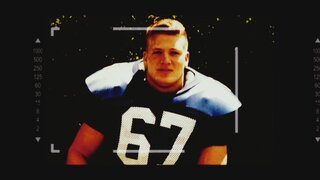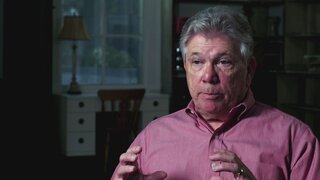Create a free profile to get unlimited access to exclusive videos, breaking news, sweepstakes, and more!
Teen Assassinates Football Star After Getting Blacklisted From Fraternity
When Trent DiGiuro and Shane Ragland enrolled at the University of Kentucky, they were filled with high hopes and ambitions.

Murders A-Z is a collection of true crime stories that take an in-depth look at both little-known and famous murders throughout history.
When Trent DiGiuro and Shane Ragland enrolled at the University of Kentucky, they were filled with high hopes and ambitions. But when Trent was mysteriously gunned down at a house party, his murder uncovered an unfathomable story of rejection and revenge.
Oxygen's new series "Dying to Belong," airing Sundays at 7/6c, revisits Trent's tragic slaying and how the promising futures of two young men were irreparably altered.
Growing up, Trent had been obsessed with football ever since he was in elementary school and had dreamed of playing for the University of Kentucky. He worked incredibly hard to secure his position as a top player, even making the team his freshman year. Trent a was a big guy but known to stand up for his friends, and people thought of him as a big teddy bear.
One of his friends told "Dying to Belong," “Trent was like the great protector of our group. Maybe because he was the biggest one, maybe because he was the strongest one.”
Another friend said, “If something would happen and a fight would break out he’d jump in and 'No more,' ya know — he’d break it up.”
While Trent was popular on campus and had been recruited by all the fraternities, he decided not to pledge to any specific frat. He just wanted to be friends with the many members of various houses. By his senior year, Trent had a starting spot on the University of Kentucky offensive line. He made academic honor roll and rented a house off campus with two friends from Sigma Alpha Epsilon, a prestigious fraternity with many successful alumni.
On Trent’s 21st birthday, July 17th, 1994, he had a small party at his place.
A retired detective told "Dying to Belong," “It was not a big wild bash by no means, I mean, this was 30 to 40 of his friends that gathered around. They were drinking. That was about it. It was his 21st birthday party. When you, when you look at it in context what you might expect — this was pretty tame.”
At the end of the evening, Trent was sitting in a recliner on his porch with a few friends chatting. All of a sudden, there was a loud bang, and people thought it was a car backfiring. One of Trents friends turned to him to ask if he heard it, but Trent was slumped in his chair with blood coming from his ear.
His friends called 911, and a few hours later Trent was pronounced dead. Police interrogated everyone at the scene. No one had seen a gun, but everyone had heard the shot. There had been a pickup truck of kids that drove by the party earlier and cat-called some women. They were told off, but could they have come back with a gun. Police sought to find out who the boys had been and sent out a media blitz to find them. But four unknown men in an unknown pickup wasn’t a strong lead.
A reporter told "Dying to Belong," “Based on where Trent was sitting, the early theory was that the shooter stepped around the corner of the porch, fired the weapon and then ran around the back."
That was assuming it was a handgun, but ballistics experts showed that the bullet came from a rifle. The crime scene then grew dramatically to hundreds of yard from the victim. A block from the house, detectives found a small mound with two divits that could have come from a bi-pod, which is a small support for a rifle. The killer could have fired from there and escaped with ease.
However it had happened, it seemed that Trent had been the target of an assassination. After extensive questioning of high school and college classmates and friends, police couldn’t find any enemies with motive for the crime.
A friend of Trent said, “We were clueless of why someone could kill such a good person. And he made such an impact on all of us it was just shocking.”
Two years later, the case had no suspect. The idea that it could have been the cat-callers had been dropped, and the investigation had no leads. Then, in the spring of 1996, police got an odd phone call from a man named David Canty. David seemed to know a lot about the case, so police came to meet with him. When they arrived, they found he had a disturbing obsession with Trent's murder.
A journalist said, “He had scribbled notes about the case on dozens of paper plates.”
David had also made his own trajectory calculations on the shot. Apparently, he even had one plate that said he and Trent were twins. And that wasn't the most suspicious part — David owned a hunting rifle with the same caliber as the bullet that killed Trent.
A retired detective said, "A .243 is not a typical caliber of rifle for hunting. It’s out there, but it’s not the standard and, you know, this guy had a .243. So, we thought that could be a connection.”
But after taking the weapon and testing it for ballistics, police found it was not a match. They soon realized that David had no relation to the victim, and he was just obsessed with the case in a strange way. He was ruled out, and three more years passed by without any breaks in the case.
In June of 1999, a local TV-station re-examined the case for a show, and a flurry of calls and tips came in. One tip stuck. A call from a local attorney that would only give a name, nothing more.
He said, “Shane Ragland.”
Shane Ragland grew up in an extremely elite family in Kentucky. His father, Jerry Ragland, was a well-known and powerful businessman. He owned a vast amount of property and leased much of it to the State Government for office space. Shane had heavy expectations to live up to, but he was known as a bit spoiled.
Shane began school at the University of Kentucky in 1991, and his time there overlapped with Trent. Shane had wanted to join the most elite fraternity possible.
A retired detective said, “Getting in any fraternity is competitive. I mean, look at so many things. There’s of course the GPA, they look at your social status. And the fact that you get in is going to significantly increase your social status on campus.”
But placement in a well-connected frat can also be a setup for a strong career. Shane set his goals on the prestigious Sigma Alpha Epsilon. Because of his father’s notoriety, Shane didn’t have to worry much about acceptance at the frat, and instead he focused on enjoying the rush parties at SAE.
Police realized Shane and Trent both had a connection through SAE, so they went to the fraternity and pulled their records.
A retired detective said, “We found a list and it listed several pledges and Shane Ragland’s name was actually crossed out.”
Next, they spoke to a close friend of Trent’s named Matt, who was pledging at SAE at the same time as Shane. Matt remembered that Trent and Shane had crossed paths one night in Trent’s dorm room. Shane had seen a photo of a girl on the wall that was part of calendar of fraternity girls. Shane pointed at her and said, “I know that girl,” and then he told the room that he had slept with her.
Unfortunately for Shane, the girl in the picture happened to be the SAE president’s girlfriend. Word got back to the president of the fraternity, and Shane was quickly removed from the frat. Shane was enraged. He was certainly not used to being told no, and the frat was incredibly important to him. He thought of it as his ticket to success. He quickly blamed Matt for telling the president and threatened him.
But Trent’s standup personality intervened, and he told Shane, “Hey, if you want to blame someone or want to pick on somebody, come pick on me”.
This story was far from a smoking gun, but at least it was a lead. Detectives went back to the lawyer who had provided the name. The name had come from a woman named Aimee, who was Shane’s ex-girlfriend. One night, they had been leveling with each other and were telling each other the worst thing they had ever done. Shane had confessed to killing Trent and had gone so far as to show her the rifle.
This weighed on Aimee’s conscience after they broke up, and she kept the secret for five years. But after seeing Trent’s parents on TV, she came forward through the lawyer. When police confronted Aimee, she agreed to work with them to get Shane.
They set up a sting where Aimee would reach out to Shane and tell him she was traveling through town. Then she would wear a wire, and undercover police would be at the location. She needed him to confess again to her.
A retired detective said, “The bartender, you know wait staff were actually police officers. We, we made sure that, that we had officers staged in different places so that in case something went wrong we could intervene. She got off her plane, he met her at the gate, uh they hugged and went on into the restaurant to have their drinks and to him it was just saying hi to an old friend.”
After some catch-up, Aimee went for it. Here’s the transcript:
Aimee Lloyd: Something has been bothering me, something that you told me a long time ago, I wish you never had. And I need to know how you feel about it now.
Shane Ragland: I regret it.
Aimee Lloyd: Are you ever going to do anything about it? Just going to kinda let it go? I mean, can you live with yourself?
Shane Ragland: I don’t have any choice, do I?
Shane Ragland: Let me ask you a question, you’re not setting me up, are you?
Aimee Lloyd: I’ve never told anybody.
Shane Ragland: I’m getting this weird vibe.
Aimee Lloyd: I never told anybody.
Shane Ragland: Swear to me you’re not going to set me up.
Aimee quickly changed the subject. The next day, the cops picked up Shane. He denied knowing Trent, and while acknowledging that he had met up with Amy, he denied talking about the murder. When detectives asked if he owned a gun, he said no. When they claimed they were searching his home and had found the rifle, he said, “I forgot about that one, sir.”
The weapon matched the caliber of bullet that killed Trent. He claimed he had told Aimee about the murder to try and scare her, adding, “I’ve done a lot of drugs in my life guys, you know I’ve done a lot of stupid things.”
It wasn’t a confession, but it was enough to charge Shane with murder. Six years after the murder, they had an arrest. His bail was set at $1 million, and his father immediately paid bail and hired the most expensive law firm in Kentucky.
Police were hoping ballistics experts would easily be able to match the gun to the bullet removed from Trent’s head. However, the ballistics expert compared six shots from the gun and could not get a match to the weapon. The defense argued that the bullet that killed Trent was in too many fragments to match to anything.
So, the whole case came down to Aimee’s testimony about Shane’s confession.
Aimee told the courtroom, “He told me that he shot him that he’s the one that killed him, and he started telling me about, you know, sort of how he did it.”
She continued, “He had taken his gun and put it in a duffle bag and got on his mountain bike, and he had ridden it down the street and around and something about going through someone’s backyard.”
Shane’s high-power lawyers weren’t going to easily let one witness determine their case. They went on a mission to destroy Aimee’s credibility in any way they could. Shane’s lawyers got ahold of Aimee’s diary from her college days and painted her as an unsavory girl.
In trial, the defense attorney, reading her diary, said, “You were ‘too sore for sex so we messed around and titty fucked. Awesome.'”
The attorney also quoted, “Made love in afternoon. Great day. My first orgasm during sex alone.”
It was incredibly harsh.
A retired detective said, “She faced that with courage and stood up to that. It was enormous.”
Everyone was worried that Shane's father was going to get him acquitted. But Shane was convicted of murder and sentenced to 30 years. The case, however, was quickly appealed. Shane’s attorneys argued that the prosecution had used an unreliable witness, an FBI agent who had testified in another case with unreliable evidence. The case was then overturned by the Kentucky Supreme Court in 2005.
Now, the prosecutor had to weigh a re-trial. But during the first trial, Aimee had been put into witness protection, and she now had a new identity. She had basically given up her life to convict Shane. The case was not nearly as strong without Aimee’s testimony, and so the district attornery struck a plea deal with Shane’s lawyers. He pleaded guilty to second-degree manslaughter, according to The Courier Journal, and he was sentenced to time served.
A radio host told "Dying to Belong," “Second-degree manslaughter was the deal that both sides agreed to. And because Ragland had already been in jail — going on eight years — he was sentenced to time served. He walked. He got away with murder.”
Aimee, fearing for her life, was in complete hiding. Trent’s family, who was devastated by Shane’s reduced sentence, filed a civil suit. Shane has since had a couple of DUIs, and then in 2014, he was paralyzed from the waist down in a single vehicle car accident.
Shane was also in court recently, according to WKLY, facing allegations of domestic abuse against his girlfriend and her children. He was taken to court by the father of the girlfriend’s children. A judge gave a Domestic Violence Order restricting Shane from being around the kids for a year.
To learn more about the case, watch "Dying to Belong" on Oxygen.
[Photo: Oxygen]


















